Introduction
How To Keep Rabbits Out Of Garden Without A Fence: Maintaining a flourishing garden can be an immensely satisfying endeavor, but when rabbits decide to make your garden their personal buffet, it can quickly become a frustrating challenge. While fences are a common solution, they might not always be feasible or desired. So, how can you keep rabbits out of your garden without resorting to the construction of barriers? This guide delves into creative and effective strategies that allow you to protect your garden from the persistent nibbling of these furry visitors, ensuring that your plants and efforts thrive harmoniously. Whether you’re an avid gardener or someone looking to preserve the beauty of your outdoor space, discovering alternative methods to deter rabbits can lead to a more fruitful and enjoyable gardening experience.
Utilizing scents that rabbits find unappealing can discourage them from venturing into your garden. Consider using natural repellents such as garlic, onions, or even predator scents like fox urine. These scents can confuse and deter rabbits, making them think twice before nibbling on your plants.Integrate plants that rabbits dislike into your garden design. Lavender, marigolds, and geraniums are known to repel rabbits due to their strong scents. Planting these strategically around your garden can act as a natural deterrent.
Rabbits are skittish creatures that can be easily startled. Motion-activated devices that emit sudden noises, flashing lights, or even sprinkler sprays can startle rabbits and make them associate your garden with potential danger.Instead of traditional fences, consider smaller physical obstacles that can deter rabbits. Chicken wire laid on the ground or around the base of plants can make it uncomfortable for rabbits to hop and dig, discouraging them from accessing your garden beds.
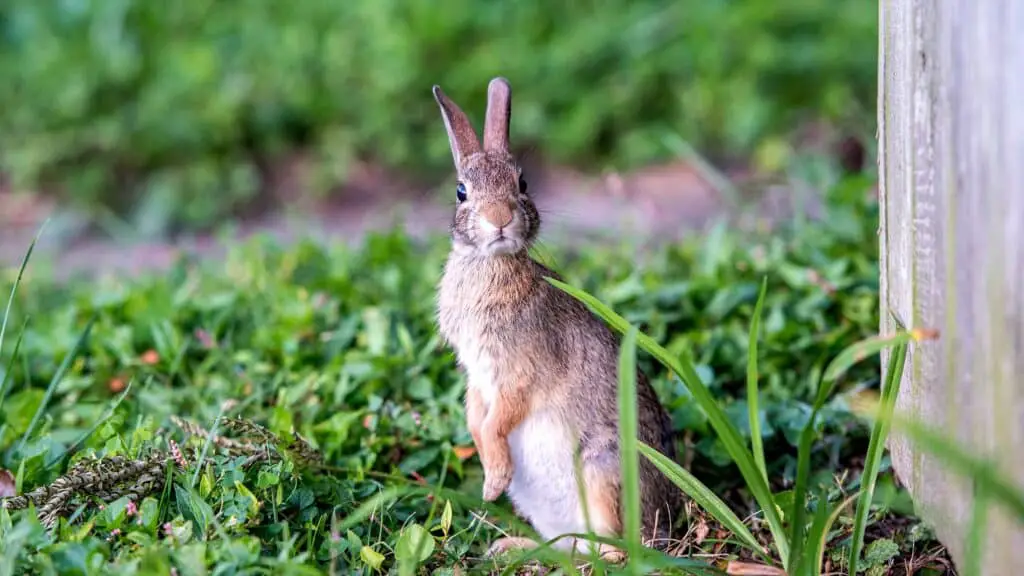
What smells do rabbits hate?
Additionally, the strong odors of blood meal, garlic, onions, mint, thyme, sage, rosemary, lavender, daffodils, and marigolds act as natural repellents for rabbits. Planting these species in our gardens or using sprays that contain their scents can help protect our plants from rabbit damage.
Garlic and Onions
Rabbits have a strong aversion to the pungent odors of garlic and onions. Placing chopped garlic or onion cloves around your garden can create a natural barrier that rabbits are hesitant to cross. However, be mindful of not using excessive amounts, as these scents might also deter beneficial insects.
Peppermint and Spearmint
Minty scents, particularly those of peppermint and spearmint, are known to be disliked by rabbits. You can plant mint varieties around the edges of your garden to create a natural barrier, or crush mint leaves and distribute them in problem areas.
Strong Herbs
Herbs like rosemary, thyme, and oregano emit scents that rabbits find unappealing. By incorporating these herbs into your garden design, you can discourage rabbits from venturing into those areas.
Predator Scents
Rabbits are prey animals, and the scent of potential predators can trigger their instincts to flee. Commercial predator scent products, like fox or coyote urine, can be strategically placed to deter rabbits. However, use caution with these products, as they might also affect other wildlife.
Hot Pepper
Capsaicin, the compound responsible for the spiciness in hot peppers, is something rabbits dislike. Mixing crushed hot pepper flakes with water and spraying it on plants can deter rabbits from nibbling.
Eucalyptus
The strong aroma of eucalyptus is not favored by rabbits. Placing eucalyptus branches or essential oil-soaked cotton balls around your garden can help deter them.
What is the cheapest way to keep rabbits out of your garden?
There is no better or more economical way to keep rabbits out of the garden than good chicken wire, or wire mesh perimeter fence, bottom bent outward and sunk to a depth of at least 6″ under the soil, and at a height of about 3 feet. You can also protect individual plants or rows with cages, or mesh.
Homemade Repellents
Crafting your own repellent sprays can be both cost-effective and efficient. Mix ingredients like crushed garlic, onions, hot pepper flakes, and water to create a potent spray. Regularly apply this mixture to your plants to discourage rabbits with scents they dislike.
Human Hair
Collect hair clippings from a local hair salon or barbershop and scatter them around your garden. Rabbits are wary of human scent, and the presence of hair can deter them from approaching your plants.
Row Covers
Lightweight row covers made from inexpensive materials like floating row fabric can serve as an effective barrier against rabbits. These covers allow sunlight, air, and moisture to reach your plants while keeping rabbits at bay.
Chicken Wire
Using chicken wire as a ground cover can create an obstacle that rabbits find challenging to navigate. Lay down the wire around vulnerable plants to discourage digging and hopping.
Plant Repellent Species
Choose plants that rabbits naturally dislike and integrate them into your garden. Plants like marigolds, mint, and lavender not only deter rabbits but also add beauty and diversity to your garden.
Empty Plastic Bottles
Placing empty plastic bottles around your garden can create movement and noise when the wind blows. Rabbits are easily startled, and these makeshift scare devices can make them think twice before venturing close.
How do I keep rabbits out of my garden naturally?
Remove Brush Piles, Branches, and Leaves
Removing debris piles of branches, leaves, and brush near your garden will eliminate their safe space and is an effective way to help repel rabbits away from their food source. You will also want to mow down tall grass.
Companion Planting
Strategically choose plants that naturally repel rabbits. Herbs like rosemary, thyme, and sage, along with flowers like marigolds and lavender, emit scents that rabbits find unappealing. By interplanting these species among your crops, you create a barrier that rabbits are less likely to breach.
Create Barriers with Plants
Use physical barriers made from plants rabbits dislike. Consider planting prickly or thorny bushes around the perimeter of your garden to create an unwelcoming environment for rabbits.
Mulch and Ground Cover
Mulching with materials like straw, pine needles, or even rose clippings can create an uneven surface that rabbits find less inviting. This can deter them from digging into your garden beds.
Beneficial Insects
Encourage the presence of natural predators like hawks, owls, and snakes that naturally keep rabbit populations in check. Providing habitats and food sources for these predators can help maintain a natural balance.
Encourage Wildlife Diversity
By creating a habitat that supports a variety of wildlife, you introduce competition for resources, making it less likely that rabbits will take over your garden.
Tall Plants as Shields
Plant tall crops like sunflowers, corn, or hollyhocks around the edges of your garden. These plants not only provide visual barriers but can also make it difficult for rabbits to access your crops.
What is the best homemade rabbit repellent?
If you’re looking for an effective rabbit repellent, look no further than your kitchen cupboard. That’s right – a simple mixture of water and citrus juice can help keep rabbits away from your garden. The citrus scent is unpleasant to rabbits, and the spray will discourage them from eating your plants.
Garlic and Onion Spray
Both garlic and onions have strong scents that rabbits find off-putting. To make a repellent spray, blend several garlic cloves and onions with water. Allow the mixture to steep for a few hours, then strain and transfer the liquid into a spray bottle. Liberally spray your plants to create a scent barrier that deters rabbits.
Hot Pepper Spray
Rabbits are sensitive to the spicy compound in hot peppers, capsaicin. To make a hot pepper spray, combine a tablespoon of crushed red pepper flakes with a gallon of water. Let the mixture steep for a day, strain it, and then spray it on your plants. Be cautious when using this spray around edible plants, as it can make them taste spicy.
Minty Fresh Repellent
Mint leaves emit a scent that rabbits dislike. Create a minty repellent spray by steeping a handful of fresh mint leaves in boiling water. Allow the mixture to cool and then strain it into a spray bottle. Spritz your plants to discourage rabbits from nibbling.
Eucalyptus Oil Solution
Eucalyptus oil has a potent aroma that rabbits find unpleasant. Mix a few drops of eucalyptus essential oil with water and a small amount of liquid soap to help the oil disperse. Spray this solution on plants and around the garden to create a deterrent scent.
Soap and Water Blend
A simple soap and water solution can help deter rabbits. Mix a few tablespoons of mild liquid soap with water and spray it on your plants. Rabbits might avoid the soapy taste and texture on the leaves.
What do rabbits fear most?
What are rabbits afraid of? ‘Rabbits are naturally fearful of anything coming from above, like their predators would. If we bend down to pick them up, that action is scary,’ says Rosie. ‘They also dislike being lifted up, as that’s what happens when they’re in a predator’s mouth.
Predators
Rabbits are prey animals, and their heightened sense of vulnerability means they are acutely attuned to the presence of predators. Natural predators like foxes, owls, hawks, and snakes are among the top fears for rabbits. These animals trigger the instinctual response to flee or hide to avoid becoming prey.
Sudden Movements
Rabbits are sensitive to motion, and sudden movements can startle them. Whether it’s a sudden human approach or an unexpected object moving in their vicinity, rabbits are quick to react by bolting to safety.
Loud Noises
Loud noises, such as claps, bangs, or sudden loud voices, can send rabbits into a frenzy. Their acute hearing makes them highly sensitive to sounds that are out of the ordinary.
Approaching Predators
The approach of a potential predator triggers the “freeze” response in rabbits. They remain motionless in the hopes that their stillness will go unnoticed by the predator. This survival strategy allows them to blend into their surroundings and avoid detection.
Unfamiliar Scents
Rabbits have a keen sense of smell, and unfamiliar scents can be a source of fear. This is why introducing new scents, like those of unfamiliar animals or even human hands, can make rabbits wary and hesitant.
How do I permanently get rid of rabbits?
Install rabbit fencing: The most reliable and effective form of rabbit deterrent is by hiring pest controllers to install rabbit fencing. This is specially designed to block rabbits from your land and is difficult for them to circumvent, particularly when installed by a professional.
Habitat Modification
Altering the landscape can discourage rabbits from taking up residence. Remove dense vegetation, trim tall grasses, and create open spaces that make it less appealing for rabbits to establish burrows and hiding spots.
Fencing
Installing sturdy fencing that extends underground can create a physical barrier that prevents rabbits from accessing your property. Opt for fencing with smaller gaps to prevent them from squeezing through.
Trapping and Removal
Using live traps can be an effective way to remove rabbits from your property. Once trapped, rabbits can be humanely relocated to a suitable habitat far away from your area. However, note that this approach might require regular monitoring and trapping to manage the population.
Predators and Natural Enemies
Encouraging the presence of natural predators like owls, hawks, foxes, and snakes can help control rabbit populations. Providing suitable habitats and food sources for these predators can contribute to a balanced ecosystem.
Fertility Control
Seeking professional assistance, consider implementing fertility control measures that reduce the reproduction rates of rabbits. This method requires expertise and careful management to avoid unintended consequences.
What can I sprinkle around my garden to keep rabbits away?
Some common ingredients include garlic, hot peppers, and vinegar. Mix the ingredients together and spray the solution on plants or around the garden perimeter. Scent repellents: Rabbit repellents that use strong scents, such as predator urine or blood meal, can be effective in deterring rabbits.
Cayenne Pepper
The spicy heat of cayenne pepper is something rabbits dislike. Sprinkle a liberal amount of cayenne pepper powder around the perimeter of your garden to discourage rabbits from venturing near.
Crushed Red Pepper Flakes
Similar to cayenne pepper, crushed red pepper flakes can create an unpalatable environment for rabbits. Sprinkle them generously around your garden to deter rabbits from nibbling on your plants.
Epsom Salt
Epsom salt, also known as magnesium sulfate, can be sprinkled around your garden to create an unwelcome texture and taste for rabbits.
Coffee Grounds
Used coffee grounds have a strong scent that rabbits find unappealing. Scatter them around your garden to create a scent barrier that keeps rabbits away.
Blood Meal
Blood meal is a fertilizer made from dried animal blood and is rich in nitrogen. Its strong smell can deter rabbits. Sprinkle it around your garden to create an odor that rabbits dislike.
Human Hair
Collect hair clippings from a local hair salon and scatter them around your garden. The scent of human hair can make rabbits wary of approaching.
How do I protect my house from rabbits?
Block cords and outlets with furniture so the rabbit cannot reach them. Carpet: Cover favorite chewing areas with a large ceramic tile or a plastic office chair mat. Choose low-pile carpeting that may be less tempting. Baseboards and corners: Use plastic or decorative wood corner protectors.
Sealing Entry Points
Inspect your house for any gaps, cracks, or openings that rabbits could use to gain access. Seal these entry points with materials like caulk, wire mesh, or hardware cloth to prevent rabbits from squeezing through.
Block Burrow Sites
Rabbits are skilled diggers and might attempt to burrow near your house. Block potential burrow sites by placing barriers like wire mesh or gravel around the base of your house.
Trim Vegetation
Rabbits are attracted to areas with lush vegetation. Trim bushes, shrubs, and grass near your house to create a less appealing environment for rabbits.
Install Fencing
Consider installing low fences around vulnerable areas of your house, such as gardens or crawl spaces. Make sure the fencing extends below ground to prevent rabbits from digging underneath.
Use Repellents
Apply natural or commercial repellents around the perimeter of your house to create a scent barrier that rabbits find unappealing.
Clear Debris
Remove debris, clutter, and potential hiding spots around your house. Rabbits are more likely to take up residence in areas that provide cover.
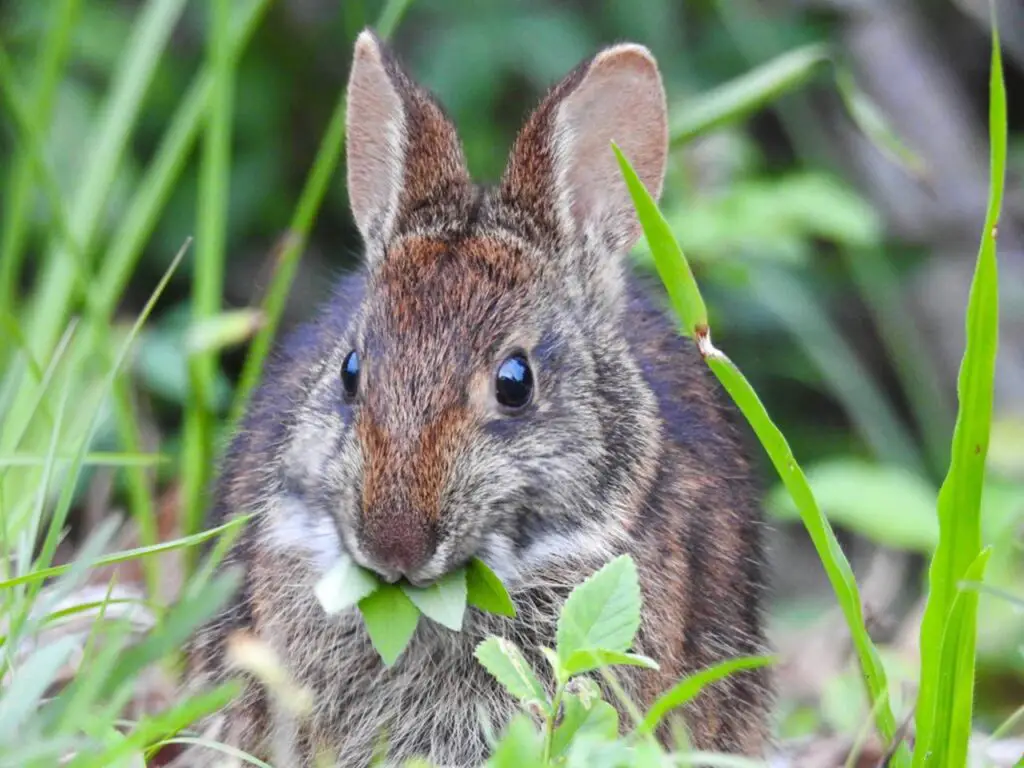
Conclusion
In the realm of gardening, the challenge of keeping rabbits out without resorting to traditional fences unveils a realm of creative and effective solutions. The pursuit of safeguarding your cherished plants becomes a testament to human ingenuity and adaptability. The strategies discussed offer not only practicality but also a deeper appreciation for the delicate balance between nature and cultivation.
By embracing natural repellents, incorporating plant diversity, employing motion-activated devices, and thinking beyond physical barriers, you’re not just preserving the aesthetic beauty of your garden, but also engaging in a dance with nature. Each method holds its own charm, a unique approach to harmonizing with the animal kingdom while ensuring your gardening efforts bear fruit.
The art of gardening is about nurturing and cultivating life, and this extends to our fellow inhabitants of the natural world. Through thoughtful planning, strategic design, and continuous observation, you can gracefully deter rabbits from your garden’s bounty. The pursuit of coexistence becomes an evolving journey, one where you adapt and refine your techniques to ensure both human and animal lives thrive.
In the end, the quest to keep rabbits out of your garden without a fence isn’t just about protection—it’s about connection. It’s a connection between the passion you pour into your garden and the delicate ecosystems that exist around it. By exploring alternative methods, you’re weaving your story into the narrative of the land, treading the path of sustainable harmony and appreciation for the wonders of the natural world.

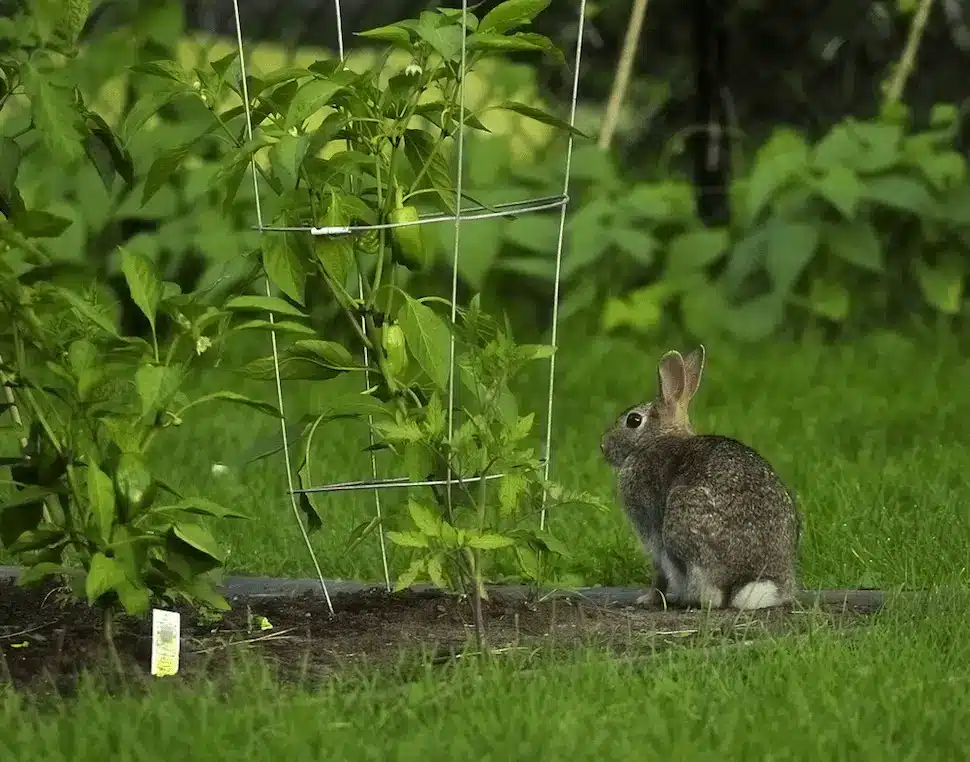
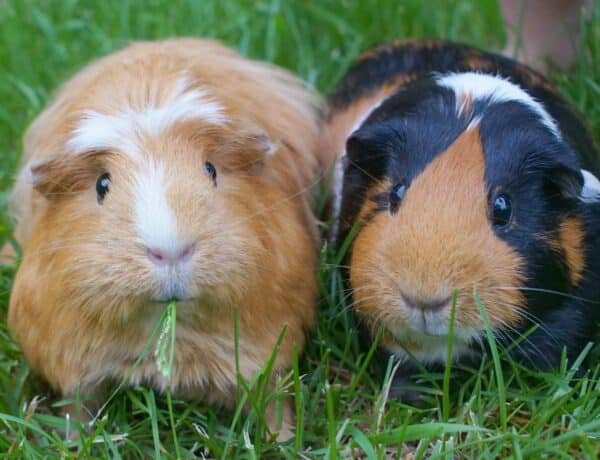

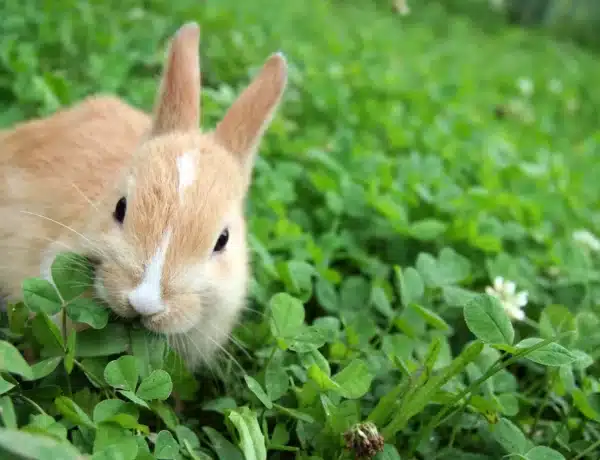
No Comments